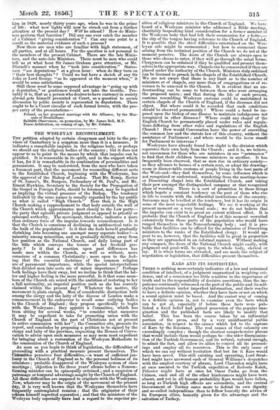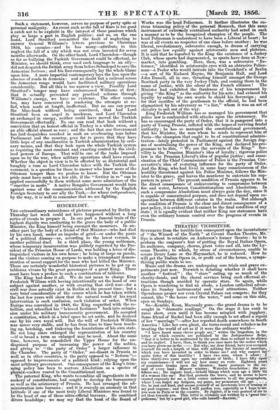KARS AND ITS DESTROYERS.
THERE is nothing more certainly indicative of a low and untrained condition of intellect, of a judgment unpractised in weighing evi- dence, and of a conscience too little sensitive to the importance of truth and to the responsibility of decisive assertions, than the im- patience continually witnessed on the part of the public and its self- styled instructors under imperfect information, and their resolve to have a definite opinion, whether they have facts or not on which a sound opinion must be based. And the easiest way of coming to a definite opinion is, not to examine even the facts which can be got at, especially if before these facts were pub- lished a fixed belief had gained possession of the popular ima- gination and the published facts are likely to modify that belief. This has been the course taken by an influential portion of the press, and by a very uninfluential public association, in respect to the causes which led to the capture of Kars by the Russians. The real causes of that calamity are exceedingly complex ; though the shortest comprehensive phrase
i
that would include them would perhaps be—the utter dieorganiza- tion of the Turkish Government, and its refusal, natural enough, to admit the fact, and allow its allies to control all its proceed- ings and employ all its resources. This is the only cause of which we can say without hesitation that but for it Kars would have been saved. This still existing and operating, Lord Strat- ford might have answered each of General Williams's despatches with the amplest courtesy of phrase, Lord Clarendon might have at once assented to the Turkish expedition of Redoute Kaleh, Pelissier might have at once let Omar Pasha go from the Crimea, each and all of the other hinderanees might have been absent, andyet in all human probability Kars would have fallen, so long as Turkish high officers are scoundrels, and the central Government of Turkey cares more to defend its own dignity and so-called independence than to follow honestly the advice of its European allies, honestly given for the advantage and the salvation of Turkey. Such a statement, however, serves no purpose of party spite or personal malignity. An event such as the fall of Kars is too good a catch not to be exploitk in the interest of those passions which play, so large a part in English politics ; and as, on the one hand, Lord Stratford committed the fault of neglecting to answer General Williams's letters previous to Christmas 1854, his enemies—and he has many—attribute to this neglect the fall of a city which was not even invested for seven months afterwards. On the other hand, Lord Clarendon—though as far as bullying the Turkish Government could be effectual, no Minister, we should think, ever used such language to an ally— did not despatch the British army from before Sebastopol to save the Armenian fortress ; and his foes consequently lay the whole blame upon him. A more impartial contemporary lays the loss upon the absence of roads in Armenia : and no doubt but a railroad across the Armenian range would. have facilitated military operations considerably. But all this is too narrow a view. Possibly Lord Stratford's temper may have embarrassed Williams at first ; that it actually prevented any practical reforms through Williams's energy, we have no evidence. The other causes, too, may have concurred in rendering the attempts at re- lief, when made at length, ineffectual. But no one can peruse the blue-book without being convinced, that had Lord Stratford been an angel in meekness, and Lord Clarendon an archangel in energy, neither could have moved the Turkish Government effectually. No one can read that book without a conviction that an honest official in Turkey is a white swan, and an able official almost as rare ; and the fact that our Government has laid despatches couched in such an overbearing tone before Parliament and the country, goes far to prove that they have little hope of any amelioration in Turkish administration by ordi- nary means, and that they look upon the whole Turkish system as requiring the most constant and exacting control by the civil- ized powers of Europe. That will be one of the tasks imposed u i in us by the war, when military operations shall have ceased. ether the object in view is to be effected by so dictatorial and haughty a tone as Lord Clarendon takes with the Turkish Go- vernment, is a question for those to answer who know more of the Ottoman temper than we profess to know. But the Ottoman pride must have sunk to a low ebb, if the " fortiter in re " can be applied successfully to them without some more admixture of the " snaviter in modo. A native Bengalee Government would turn against some of the communications addressed by. the English Foreign Secretary to our ally the Turk,—for whose independence, by the way, it is well to remember that we are fighting.



























 Previous page
Previous page